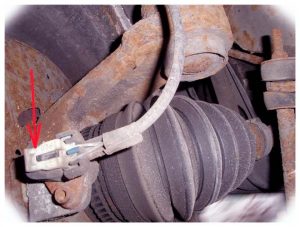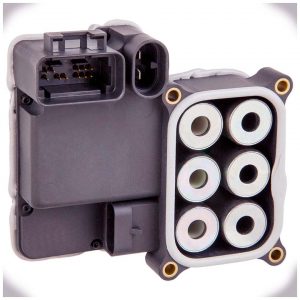Antilock Braking System (ABS) is an automotive safety system that helps drivers control the vehicle when braking in sudden, urgent situations. It works by preventing the brakes from locking, thus allowing drivers to maintain control and avoid potential collisions. This safety feature is particularly useful in slippery or wet road conditions.
In order for an ABS system to operate correctly, it must detect the speed of each wheel independently. To do this, it uses wheel speed sensors that monitor the rotational speed of each tire and sends this information to the control module. When one or more wheels start rotating much slower than the others, indicating that a skid may be imminent, the module will activate a series of valves connected to each brake caliper. This allows some brake pressure release while maintaining some braking force on all four wheels simultaneously, enabling drivers to steer away from potential obstacles more effectively.
Low-Speed ABS Activation: An Overview
Defining Low-Speed ABS Activation
Low-speed antilock braking activation occurs when the brake system activates even when driving at relatively low speeds (usually below 10 mph). It is important to note that the ABS system will kick in and activate even at such low speeds when the vehicle is suddenly brought to a stop, and this is normal. However, if it happens while driving or when the vehicle is moving slowly, there may be an issue with one of its components.
Potential Risks and Drawbacks
Low-speed ABS activation can cause issues ranging from inefficient braking to increased wear on components and other safety risks. In some cases, it can even lead to complete brake failure. Because of this, it’s critical to diagnose and address these issues as soon as possible to ensure optimal performance of the braking system.
Common Causes of Low-Speed ABS Activation
 Faulty Wheel Speed Sensors
Faulty Wheel Speed Sensors
Wheel speed sensors monitor each wheel’s rotational speed so that the ABS control module knows when a skid may be imminent. If one or more sensors become faulty or worn out, they may trigger false readings which cause the ABS system to activate even at low speeds.
Worn or Damaged Tone Rings
Tone rings near each wheel hub assembly help detect rotational speed by providing a reference signal to the wheel speed sensors. If these rings become worn or damaged, they may cause false readings, leading to premature ABS activation.
Corroded or Damaged Wiring
The wiring harness that connects each wheel speed sensor to the ABS control module is responsible for transferring the data collected by each sensor and must be kept in good condition for the system to operate properly. If corrosion or damage occurs, it can cause false readings and lead to low-speed ABS activation.
Malfunctioning ABS Control Module
The ABS control module is responsible for interpreting data from each wheel speed sensor and activating the valves accordingly when necessary. An issue with the control module could result in erroneous readings and premature activation of the brakes at low speeds.
Diagnosing Low-Speed ABS Activation Issues
Visual Inspection
The first step in diagnosing any issue with an antilock braking system is performing a visual inspection of all components related to its operation. This includes checking for any signs of damage on tone rings, wiring, connectors, wheel speed sensors, etc., which may indicate potential issues causing low-speed activation.
Scanning for Diagnostic Trouble Codes
A diagnostic scan should also be performed to check for any trouble codes related to the ABS system. These codes can help pinpoint the specific component or issue causing the low-speed activation.
Testing Wheel Speed Sensors and Wiring
Once potential issues have been identified, further tests may be necessary to confirm their cause. This includes testing the wheel speed sensors with an ohm meter as well as checking for continuity and resistance in the wiring harness.
 Examining the ABS Control Module
Examining the ABS Control Module
In some cases, inspecting and testing the ABS control module itself may be necessary if there are no issues with other components. This can help determine whether or not any malfunctions in its operation could be causing premature activation of the brakes at low speeds.
Solutions and Repair Options
Replacing Faulty Wheel Speed Sensors
If a faulty wheel speed sensor is causing low-speed ABS activation, it should be replaced with a new one as soon as possible. It is important to ensure that all four sensors are in good working condition so that the control module accurately monitors data from each wheel.
Repairing or Replacing Damaged Tone Rings
If a damaged tone ring is causing erroneous readings and triggering the brakes at low speeds, it should be repaired or replaced. In some cases, repairing may be possible, but replacing the ring is recommended if the damage is too extensive.
Fixing Wiring Issues
Wiring issues such as corrosion or breaks can cause false readings that trigger premature ABS activation. If this is the case, the wiring harness should be inspected and repaired as needed to ensure proper data transfer from each wheel speed sensor to the control module.
Addressing ABS Control Module Problems
If an issue with the ABS control module is causing low-speed activation of the brakes, it should be examined and tested more closely. It may need to be reset or replaced to restore proper system operation.
Preventive Measures and Maintenance Tips
Regular Inspection of ABS Components
It’s important to regularly inspect all components of an antilock braking system to identify any potential issues before they become serious problems. This includes checking for signs of wear on wheel speed sensors, tone rings, wiring harnesses, and connectors.
Timely Replacement of Worn Parts
If any components are worn or damaged, they should be replaced as soon as possible to avoid potential risks and ensure optimal performance of the ABS system.
Keeping Wiring and Connectors Clean and Secure
It is also important to keep all wiring and connectors clean to prevent corrosion or loosening, which can cause false readings or disrupt data transfer. If any corrosion or damage is present, it should be addressed immediately.
Staying Up-to-Date on Vehicle Recalls and Updates
Lastly, it is important to stay up-to-date on any vehicle recalls related to ABS systems and software updates that may help improve performance or address any potential issues.
When to Seek Professional Help
Persistent or Complex Issues
Suppose you are experiencing low-speed ABS activation that does not go away after following the steps above. In that case, it may be time to seek professional help from an experienced technician with the right tools and expertise for a more detailed inspection and diagnosis of the issue.
Lack of Proper Tools or Expertise
If you do not have access to the proper diagnostic tools or expertise to diagnose and resolve the issue, seek professional help. This will ensure that the problem is addressed quickly and correctly in order to avoid potential risks.
Warranty or Insurance Considerations
It is also important to consider any warranty or insurance coverage that may be available for repairs related to an antilock braking system. In some cases, you may be covered for certain ABS-related issues, saving you significant time and money in the long run.
Conclusion
Low-speed ABS activation can cause a number of issues ranging from inefficient braking performance to increased wear on components and potential safety risks. Diagnosing and addressing these issues as soon as possible is important to ensure optimal performance of the entire braking system. By following preventive measures such as regular inspection, timely replacement of worn parts, and staying up-to-date on vehicle recalls and updates, drivers can help keep their vehicles’ ABS systems performing at their best. However, if persistent or complex issues arise that require more advanced tools or expertise, professional help should be sought in order to avoid potential risks associated with such issues.


 Faulty Wheel Speed Sensors
Faulty Wheel Speed Sensors Examining the ABS Control Module
Examining the ABS Control Module
Add Comment